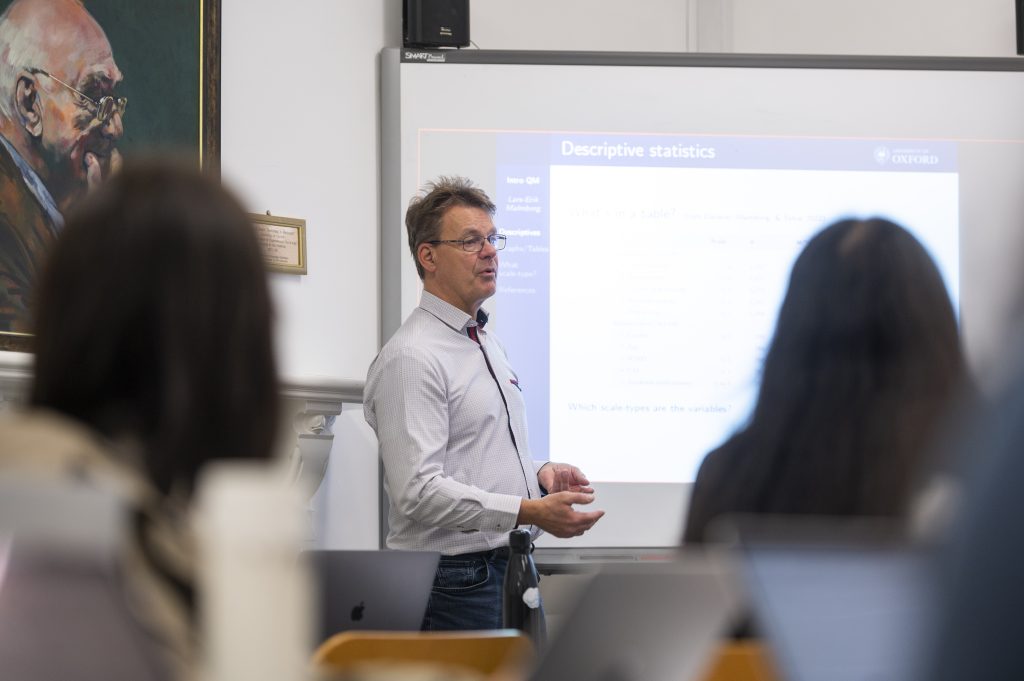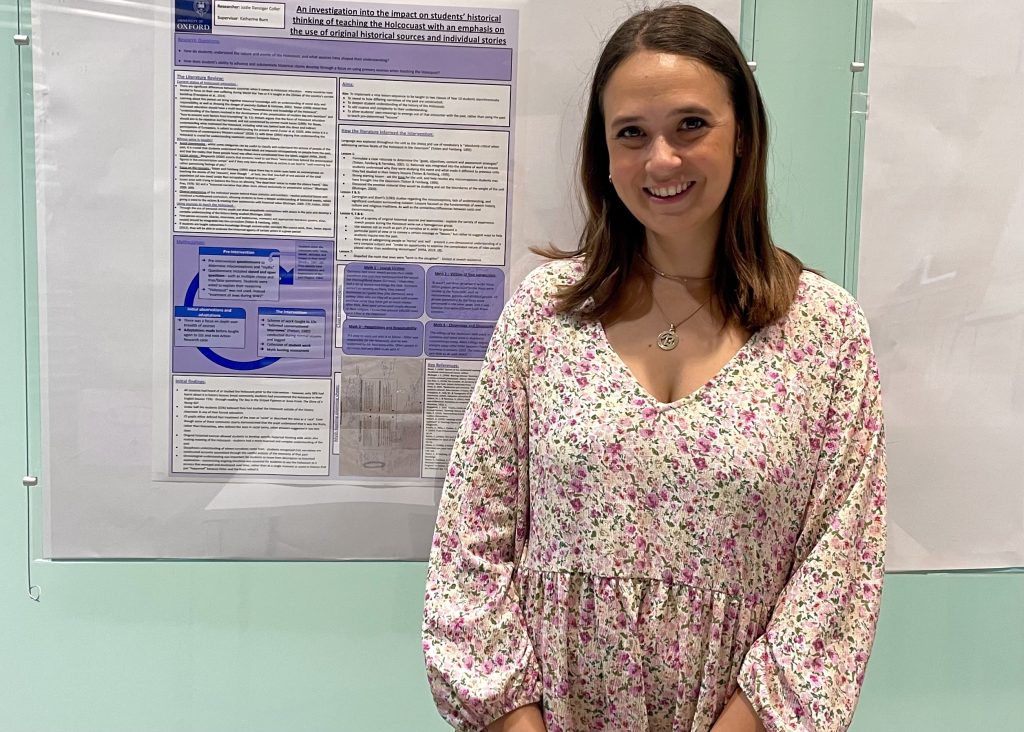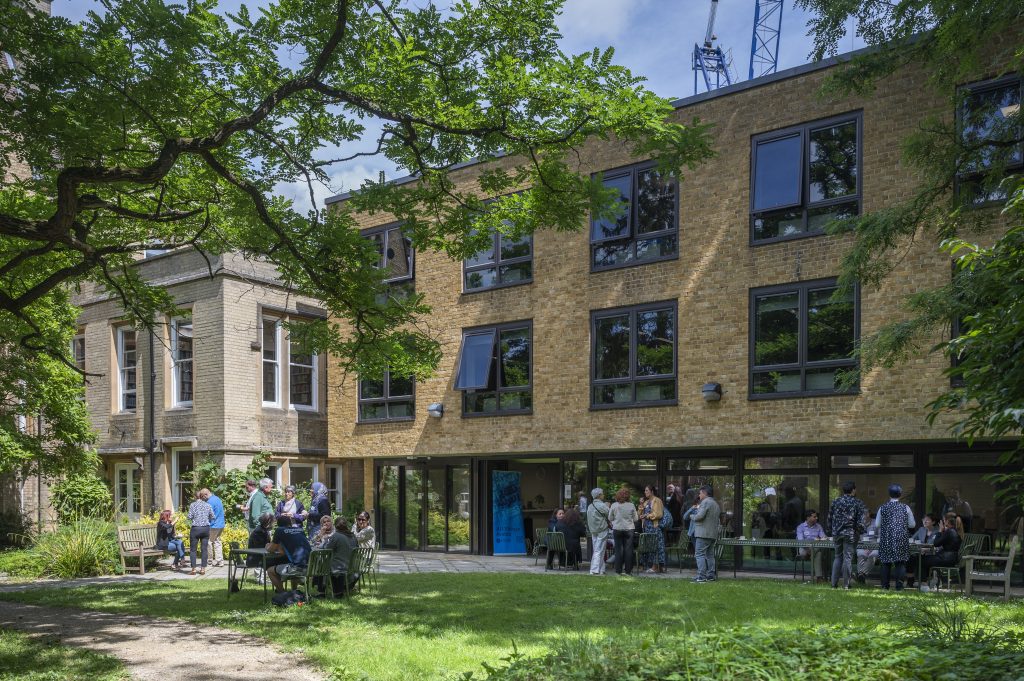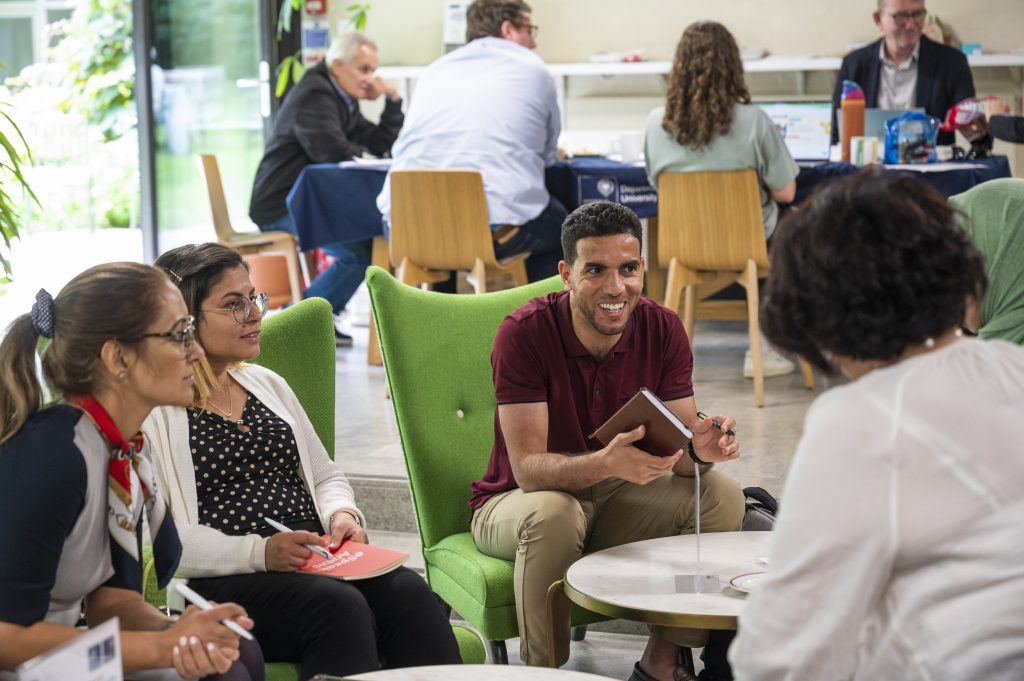Welcome
This is a professional development course for qualified teachers who are currently working in schools or similar educational settings. It focuses on developing your pedagogical practice in schools and classrooms through engagement with and in research.
The programme is part-time, intended for teachers, in both primary and secondary schools and further education, including school leaders and school improvement officers who are interested in developing a research-informed approach to their existing practice. It addresses the processes of learning and teaching, and is rooted in your own practice in school (or a similar educational setting). It is not possible to enrol if you are not currently working in a school (or similar setting) and is unsuitable for those in higher education. The blended course involves attending teaching weekends (held on Friday afternoons and Saturdays), carrying out investigations in school, which are supported by set readings, and online discussions. We value the role of shared face-to-face discussion, and do not offer an entirely distance learning option.
Applicants are expected to have a PGCE with master’s credits, or equivalent academic or professional qualifications, or experience. The course lasts for two years. In Year 1, attendance is required at five intensive two-day residential courses in Oxford. Supervision will mainly be offered within small subject-specific or generic groups, from a specialist supervisor. In Year 2, you will largely work with a specialist supervisor on your own project.
The course has enabled many alumni to progress on to leadership roles in schools, including headship.
WATCH: MSc Learning and Teaching students share their experiences:
Apply Now
To apply, you will need to complete an application through the central University website and provide samples of written work and a personal statement.

The course
This is a professional development course for qualified teachers who are currently working in schools or similar educational settings. It focuses on developing your pedagogical practice in schools and classrooms through engagement with and in research.
The programme is part-time, intended for teachers, in both primary and secondary schools and further education, including school leaders and school improvement officers, who are interested in developing a research-informed approach to their existing practice. It addresses the processes of learning and teaching, and is rooted in your own practice in school (or a similar educational setting). It is not possible to enrol if you are not currently working in a school (or similar setting) and is unsuitable for those in higher education. The blended course involves attending teaching weekends (held on Friday afternoons and Saturdays), carrying out investigations in school, which are supported by set readings, and online discussions. We value the role of shared face-to-face discussion, and do not offer an entirely distance learning option.
Applicants are expected to have a PGCE with master’s credits, or equivalent academic or professional qualifications, or experience. The course lasts for two years. In Year 1, attendance is required at five intensive two-day residential courses in Oxford. Supervision will mainly be offered within small subject-specific or generic groups, from a specialist supervisor. In Year 2, you will largely work with a specialist supervisor on your own project.
Throughout the course there is a strong emphasis on collaboration within your school and across the course. The University’s Virtual Learning Environment platforms (Canvas and Teams) are used to support the school-based tasks and sustain critical discussion with peers. In addition to attendance at the seminars, all students are expected to engage in online activities, reporting and reflecting on their reading and school- based investigations.
Core teaching for all students is supported by work in supervision groups exploring the specific applications and implications of these key ideas in their curriculum areas or more generally. Some of the teaching and all of the supervision in Year 1 is offered on a subject-specific basis (where the department has particular expertise).
The course has enabled many alumni to progress on to leadership roles in schools, including headship. Students have also progressed on to the DPhil in our own department.
The course is built around four main themes, with illustrative content:
- Teachers and learners
Educational research about and for teachers, notably theories of efficacy and agency, pupil identity and agency, how pupils learn, including pupils’ perspectives on learning
- Curriculum, pedagogy, and assessment
Curriculum theory, generic and subject-specific issues in curriculum, pedagogy and assessment, ask design, theories of assessment, alignment
- Responding to pupils
Learners, diversity and inclusion, special educational needs, adolescence and well-being, motivation, classroom talk and curriculum development
- Schools, equity and achievement
Educational research, professional communities and networks, schools in policy; professional collaboration within and between schools, educational policy, the inter-relationship between achievement, diversity and disadvantage
In the second year you will undertake a Research and Development unit in which you will research an aspect of teaching in your subject for a dissertation. The taught programme for this part of the course will focus on advanced methods of practitioner research, particularly the challenges of identifying a worthwhile innovation for the research and development work, elaborating the criteria for success and determining the nature of the evidence that will allow the participant to evaluate the impact of the innovation. The programme also includes a key focus on collaborative strategies within research and development work in schools and their communities.
The focus of the final research and development project is chosen by the student to reflect their own needs or interests and those of the context in which they work.
The project must involve the implementation and evaluation of some kind of teaching innovation in the student’s own context (which may be their own classroom, or within the school and its local community, or even across a network of schools). The project must include a collaborative dimension which means that students need either to engage their colleagues (e.g. teachers, teaching assistants) or other stakeholders (e.g. parents) in the school-based research work, or to develop ways of sharing their findings that encourage others to engage in further development work.
As part of the work for their research and development project, students will be expected to contribute to an annual conference held for course participants presenting ideas about effective research instruments and strategies to evaluate the effectiveness of the teaching innovations they introduced.
Projects completed by students include:

- Getting all International Baccalaureate Diploma Programme Teachers involved in the theory of knowledge course: Action research in a South East Asia IB school
- Boys and Geography: An inquiry into student-led learning as a strategy for increasing engagement at GCSE
- Perceptions of learners and classroom practitioners on the value of physical education as an ‘academic’ subject in a grammar school
- History and change: How to help pupils write effectively about the concept of continuity and change in history
- Tackling underachievement in Y12 Biology; how can teachers influence pupil motivation?
- Developing mathematical reasoning and problem-solving skills – an investigation into strategies to develop students’ mathematics in a Year 7 mixed ability class
- “I would like support from school when it comes to doing extra to get into one of the top universities” How do high achieving history students respond to University preparation classes?
- Supporting pupil premium attainment in science exams
- Is summative assessment in science the tail that wags the teaching and learning body? Can assessment for learning offer a way forward?
- Challenging conceptions of boys as reluctant readers: an investigation into boys’ reading preferences and how they might be developed to improve boys’ achievement in English
- A virtual writing community: An investigation into the Internet’s potential to engage girls in writing outside of the classroom
- What roles do funds of knowledge and learning dispositions have in the development of primary pupils’ writing?
- Identity Development in the Secondary School: adolescents as ‘selves’ as well as ‘learners’
- Formative assessment: an ICT intervention to improve students’ motivation to learn away from the classroom
- Investigating ways of preventing students’ anxiety during spontaneous Target Language use in the MFL classroom
Programme of study

Year 1
Duration: 1 year (part-time) involving five two-day intensive courses at the Department and a series of school-based research tasks shared online between each weekend seminar.
Form of assessment: One assignment of 8000-10000 words
Year 2
Duration: 1 year (part-time) including two intensive weekends at the Department.
Form of assessment: A research and development project of between 15000 and 20000 words , reporting on an empirical research study in relation to the development of professional practice within the participant’s own school or educational setting. This academic report of the design, implementation and evaluation of a specific innovation must include a strong emphasis on the choice of criteria and the nature of the evidence by which the impact of the evaluation was assessed, and clear evidence of research collaboration with other adults – either engaging others in research; or enabling others engaged in education to learn from research findings.
Assessment is through formally submitted assignments at the end of each year. In Year 1, you will draw on the content of the units studied, while in Year 2, you will be required to complete a research and development project, which involves implementing a new strategy and reviewing its progress, while working with colleagues. All assignments are submitted online through the University’s Virtual Learning Environment and are subject to the rules and regulations surrounding examined submissions. Students’ final award is based upon the outcome of the Year 1 assignment and the Year 2 dissertation.
Apply Now
To apply, you will need to complete an application through the central University website and provide samples of written work and a personal statement.

Meet our students

Lifelong learning is something I try to instil into all my students. For me, studying education allowed me to continue to develop my own practice as a teacher through reflecting on my pedagogy and engaging with research.
Apply Now
To apply, you will need to complete an application through the central University website and provide samples of written work and a personal statement.

Scholarships
Please see below for bursary and scholarship opportunities:
Educational Citizenship Scholarship

The Department is delighted to offer a scholarship for practising educators who are enrolled on the MSc in Learning and Teaching course at the University of Oxford for Michaelmas Term 2025. In order to be eligible for this award, you must submit your application for the course by 1 March.
Find out more about the Educational Citizenship Scholarship and how to apply.
Religious Education

3forRE is a way to help teachers of RE to take relevant master’s courses in an affordable, manageable way. It is a unique scheme based on a three-way partnership between you, your school and Culham St Gabriel’s Trust. Please visit the website for further details.
Please note: The level and availability of any future awards are contingent upon continued contribution(s) by donor(s).
Apply Now
To apply, you will need to complete an application through the central University website and provide samples of written work and a personal statement.

FAQs
Who is the course for?

We welcome teachers at all levels of schooling (primary, secondary, sixth form, FE), in any subject, or with more general teaching or leadership roles.
The Department has research expertise in several specific subjects, English, Mathematics, Science, History, Modern Languages, Religious Education and Geography. However, we welcome applicants from other subject disciplines or who have wider roles in schools. Previously, we have supported teachers of music, art, PE, economics, drama, business studies computer science and classics, as well as SENCOs, deputy heads, head teachers, school improvement officers, and inspectors.
The Department includes strong research programmes related to pre-school and primary education and to wider issues in education and training, and we are able to draw on this expertise to inform teaching and give students access to specialist guidance.
Teachers of all phases of education – KS1-KS5 – are therefore welcome to apply but need to be aware that most participants are likely to be secondary school teachers. In the past years we have accepted several primary school teachers into the programme. They are then able to pursue an area of curriculum specialisation alongside secondary school colleagues, or more general interests. Teachers from other subjects such as Business Studies, Health Care, Latin or PE, tend to work in more generic groups.
How much time will I be expected to spend on study?

We are aware that our students have busy lives and we try to schedule major tasks to be completed during holiday periods. There are texts to be read in your own time and tasks to be undertaken in school but we anticipate that over the year, your commitment would average out to about two to three hours per week. The reading commitment for the final dissertation is greater than for the taught course, and you will need to build this into your planning. If you have maintained a steady reading programme throughout the early stages of the course, the final year will be that much easier. During Year 1, you are expected to attend the five weekend seminars and complete the reading and investigative tasks. In the second year there are two weekend seminars, usually in October and June, and an optional session in February. All the tasks, assignments and readings are online from the start of the course.
How will my work on the course be supported?

You will be allocated a supervisor who will provide individual guidance and you will gain access to the University’s VLE platforms (Canvas and Teams); we require students to use them to discuss aspects of their work. You will also have the opportunity to meet with other members of your subject specific (or generic) support group throughout the year (see above).
How often will I need to come to the Department for meetings?

Attendance is normally required in Oxford at five seminars over the first year of the course, with some tasks online, and twice in the second year. The weekend seminars mostly run from late afternoon on Friday to late afternoon on Saturday.
Do I have to apply to a college?

College affiliation is an important part of being a student at Oxford. Please note that there is no guarantee that you will be placed at any given College, and a place will be found for you where possible. Find out more about the colleges and making an open application on the University website.
What should I include in the statement of purpose on the application form?

The statement of purpose tells us why you are interested in doing this course. You might have particular priorities that you want to investigate or to develop in your teaching and already know the kind of ideas you want to explore in your final research and development project. You may have taken on a new role or responsibility at school and be looking to develop particular kinds of knowledge or expertise, perhaps involving work with others. Your interests could relate to the particular needs of the students that you are teaching, or to the demands of a new kind of syllabus, or leadership position. But you might simply be looking for structured support and access to ideas and resources that will challenge and extend your thinking and understanding of the teaching and learning process, giving you new ideas and the encouragement to experiment with different approaches. Your school may have particular reasons for encouraging you to undertake the course, again perhaps with a specific development project in mind. Do tell us if you have any particular aims of this kind or if there are specific challenges in your teaching/school context to which you are seeking answers. If your ideas are less focused, it is fine simply to explain in more general terms what you are hoping to get out of the course and why you would have the support of your school (or other setting) in undertaking it now.
Who should I choose as my referees?

You are required to provide three referees on your application form. We are looking for references from your school and from another institution, for example, a course tutor if you have completed your PGCE course in the past two years, or a previous school. We would like to see a reference from your Headteacher or Head o Department if possible as the research work you will carry out will be within the school.
We strongly advise you to discuss the course with your Headteacher as you may need to leave school earlier than normal on seminar weekends in order to travel to Oxford. Attendance at these seminars is a requirement of the course.
Please note that, as part of the University regulations, the Graduate Admissions Office is unable to release your application to us until you have provided at least two references with your application (either by paper or online). Once we have received and considered your application we will then make a decision whether or not we wish to pursue the third if you have not already provided it.
Will I be able to pay fees in instalments?

Course fees are collected by the colleges. Colleges operate their own fees schedule and this arrangement is dependent on the college.
Apply Now
To apply, you will need to complete an application through the central University website and provide samples of written work and a personal statement.

Contact
Couldn’t find your answers under our FAQ section?
Please direct any enquiries to our administrative team, and they will be happy to assist you.
Phone: +44 (0)1865 284897
Email: msc.learnandteach@education.ox.ac.uk
Apply Now
To apply, you will need to complete an application through the central University website and provide samples of written work and a personal statement.








